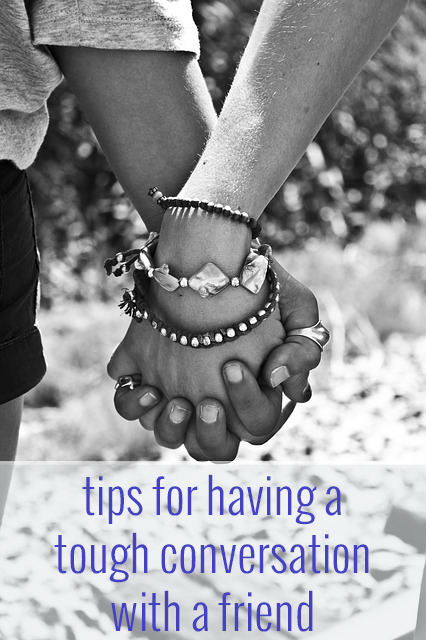
Chatting with friends is always a welcome activity – unless it involves discussing a serious issue. There’s a lot of anxiety associated with confronting a bestie! Are you being too aggressive? Too wishy-washy? What if she gets mad? What if you cry? Well, I can’t predict the future, but I can assure you it doesn’t need to be as frightening as all that. With a plethora of tough conversations under my belt, I feel qualified to pass some tips on to you. Here are my top five:
1. Intention is important
When you need to talk about an important topic with a friend, chances are that it’s going to be quite an emotionally charged conversation. For that reason you should make sure that you are prudent in choosing a time, place, and reason to have the discussion.
While your emotions should be taken into consideration you should also make sure not to be be swept up in the heat of the moment. If you’re feeling frustrated with your friend and end up barraging her with, “Actually, I’ve been wanting to talk to you for a while about how mean you’ve been recently”, I can assure you the conversation will not go well.
The intention should be to pinpoint the issue and solve or respond to it, not to assuage hurt feelings or vent about a big issue. Don’t have an outburst because you’re angry and don’t have a heart-to-heart because you’re afraid she’s pulling away and you want to use emotional glue to feel closer.
2. Plan ahead
I used to feel so overwhelmed by the prospect of discoursing on a Big Topic that I would actually write down word-for word the things I wanted to say, like a politician penning an address. Recently I’ve had so much practice at having Big Conversations that I’ve chilled out quite a bit in regards to preparation.
These days I tend to organize my thoughts by writing bullet points (not a fleshed out speech) of what I want to say or how I feel on the topic. Not only does it help the confrontation go more smoothly, but I also find that I’m able to view my thoughts and emotions in a more accurate way, having already thought them through.
Make sure you have enough time to cover the topic at hand. If it’s meant to be a private conversation you’ll want to ensure that you won’t be overheard. You’d be surprised how the fear of being overheard can hinder your ability to be open and to have an unencumbered conversation.
3. Have a “thesis statement”
Remember when you needed to give a thesis statement for school papers? Believe it or not that’s one thing you learned in fourth grade that will do you some good in the real world.
I’ve found that applying that same mentality of a thesis “topic” is extremely helpful in tough discussions. Being mindful of a main point will help you and your friend to address the real issue instead of spiraling into side conversations or digging up old skeletons irrelevant to the issue at hand.
Of course you’re bound to go on a tangent at least somewhat, but having a clear-cut conversation goal in mind will greatly improve the emotional health of the discussion.
4. Communicate clearly
Don’t ambiguously dance around the real point. Tell her you’re upset by the comment she made at the party last night in front of your ex, and why. Don’t go on about how you “sometimes” feel hurt when she “accidentally” mentions old college stories in front of “certain people.” If you think it will help, it might be a good idea to tell your friend about your thesis statement. That way both of you will be conscious about staying on track.
This isn’t the time to be passive-aggressive. If you have the courage to speak with your friend about something serious and she refuses to listen or becomes unreasonably argumentative, then perhaps there’s a deeper issue.
5. Allow yourself some time to cool off
Don’t be afraid to interrupt yourselves. If you feel like things are becoming too emotionally overwhelming or unproductive then simply explain how you’re feeling and make the decision to chill out for a while, whether that needs to be an hour or a week. You can always pick up where you left off after you both have had some time to reassess how you’re feeling about the issue.
It might take some practice to really get these tips down, but I’m confident that you’ll manage. And just think: If you nail this tricky situation while you’re only in your twenties, you’ll be an expert communicator for the rest of your life! What more can you ask for?
